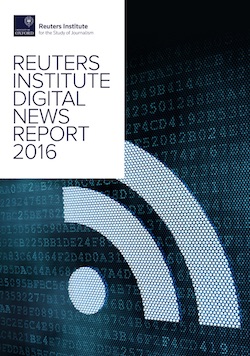June research published by Reuters Institute for the Study of Journalism illustrates the rising global popularity of social media's use as a news source.
Reuters’ “Digital News Report 2016,” which polled approximately 50,000 people in 26 countries around the world, reported that more than half — 51 percent — of respondents said they now use social media as a weekly news source, and nearly a quarter — 24 percent — said they share news items with others via that medium. Of those polled, 12 percent claimed that social media is now their primary source of news.
 The study found that the practice of using social media as a news source is especially common among women and younger generations. Women are 11 percent more likely to come across news on social media than men, and nearly a third — 28 percent — of those surveyed between the ages of 18 and 24 now claim that social media is their primary source of news, beating TV for the first time, which ranked at 24 percent (print, by contrast, drew a distant six percent). The report stated that social media is now a more important source for news than TV news for every age group categorized under the age of 45, delegating television a medium now preferred by older generations.
The study found that the practice of using social media as a news source is especially common among women and younger generations. Women are 11 percent more likely to come across news on social media than men, and nearly a third — 28 percent — of those surveyed between the ages of 18 and 24 now claim that social media is their primary source of news, beating TV for the first time, which ranked at 24 percent (print, by contrast, drew a distant six percent). The report stated that social media is now a more important source for news than TV news for every age group categorized under the age of 45, delegating television a medium now preferred by older generations.
It’s also a phenomenon common in the U.S.: 46 percent of American respondents now cite social media as a news source, nearly twice the amount of respondents who said this three years ago, according to Reuters. Additionally, 14 percent of all Americans polled said social media is now their main source of news, outranking most of the 26 countries included in the poll, with the exception for Ireland, Portugal, Brazil, Australia and Greece.
Facebook is, by far, the most popular social network for news-gathering, with 44 percent admitting they use that site as a news source. YouTube comes in a distant second — at 19 percent — and about 10 percent said they use Twitter for news. Facebook was also the most popular social network in every country surveyed, with the exception of Japan, where YouTube beats Facebook as the largest Western social network. Twitter also rivals Facebook for popularity in that country.
The report concludes that the surge of news accessed via social media sites has accounted for “the biggest change in digital media,” and its authors “find strong concerns that personalized news and more algorithmic selection of news will mean missing out on important information or challenging viewpoints.” The study mentions that most people tend to share news items that meet only their approval.
Reuters' annual study, which gauges news consumption habits around the world, commissioned Internet-based market research firm YouGov, which polled approximately 2,000 people in each of the 26 countries surveyed with the use of an online questionnaire. Research was conducted between January and February.
The entire report can be viewed here.


 What if companies could harness the fury of online outrage into a force for good? This is precisely where companies can start turning the trolls into brand champions.
What if companies could harness the fury of online outrage into a force for good? This is precisely where companies can start turning the trolls into brand champions. Audiences interacted with brand content far more often on Facebook and Instagram in 2023 than they did via X (formerly Twitter), according to a report that tracked engagement trends across different social networks.
Audiences interacted with brand content far more often on Facebook and Instagram in 2023 than they did via X (formerly Twitter), according to a report that tracked engagement trends across different social networks. Can public relations help counteract the dissension fostered by the power of digital platforms to spread hate, fear and confusion?
Can public relations help counteract the dissension fostered by the power of digital platforms to spread hate, fear and confusion? The number of Americans who get their news from TikTok has quadrupled in the last three years, according to a recent Pew Research Center report.
The number of Americans who get their news from TikTok has quadrupled in the last three years, according to a recent Pew Research Center report.


 Have a comment? Send it to
Have a comment? Send it to 
No comments have been submitted for this story yet.